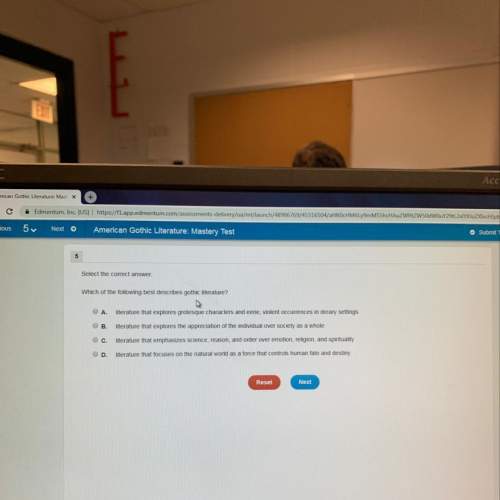What is the significance of setting in fictional literature?
the setting supports the a...

English, 12.11.2019 16:31, alyxxboothe
What is the significance of setting in fictional literature?
the setting supports the action and character development.
the setting is fabricated or made-up.
the setting is consistent from beginning to end.
the setting evolves from the moral of the story.

Answers: 3
Other questions on the subject: English

English, 21.06.2019 21:00, mbrisen3396
Hamlet act 1 what advice does polonius give his son, laertes?
Answers: 1

English, 22.06.2019 03:30, aliviafrancois2000
In just over one hundred years, between 1701 and 1810, 252,500 enslaved africans were brought to barbados—an island that occupies only 166 square miles (making it, today, one of the smallest countries in the world). the english then set out to conquer more sugar islands, starting with jamaica, which they took from spain in 1655. in the same period that the 252,500 africans were brought to barbados, 662,400 africans were taken to jamaica. thus, sugar drove more than 900,000 people into slavery, across the atlantic, to barbados and jamaica—and these were just two of the sugar islands. the english were eagerly filling antigua, nevis, saint kitts, and montserrat with slaves and sugar mills. they took over much of dutch guiana for the same reason. seeing the fortunes being made in sugar, the french started their own scramble to turn the half of the island of hispaniola that they controlled (which is now haiti), as well as martinique, guadeloupe, and french guiana (along the south american coast near dutch guiana), into their own sugar colonies, which were filled with hundreds of thousands more african slaves. by 1753, british ships were taking average of 34,250 slaves from africa every year, and by 1768, that number had reached 53,100. –sugar changed the world, marc aronson and marina budhos how do the authors use historical evidence to support their claim? x(a) they use secondary sources to show how french and english monarchs were indifferent to enslaved people. x(b)they use secondary sources to show that enslaved people often fought for their freedom after arriving in the caribbean. the answer is: (c)they use facts from primary sources to show how countries increased the number of enslaved people to produce more sugar. x(d)they use primary source interviews to show that countries could make more money in trading sugar without using enslaved people.
Answers: 1

English, 22.06.2019 05:00, lenaeeee
“tell me o swan, your ancient tale” by kabir “the swan” by rilke “spanish dancer” by rilke “your laughter” by pablo neruda “birthplace” by shaffarzadeh “it’s this way” by nazim hikmet “counting small-boned bodies” by robert bly choose two poems that you would like to write about. analyze each poem. study the perspective, or point of view, of the speaker in each of the two poems that you select for this assignment. consider these questions: who is the speaker in each of these poems? what is the speaker’s tone? is there a conflict? is there a message? what does each of the poems have in common? what is different about each of the poems? which literary devices are used in the poems? are these literary devices found in both of the poems? what does the speaker hope to achieve in each of the poems? how are these achievements/goals been met? directions: using the two poems of your choosing, write a clear, concise, two hundred and fifty word essay that compares and contrasts the two poems. make sure you include at least two of the following to support your thesis: tone, point of view, literary devices, and meter.
Answers: 1

English, 22.06.2019 07:30, genyjoannerubiera
Read this excerpt from the grapes of wrath: snub-nosed monsters, raising the dust and sticking theirsnouts into it, straight down the country, across thecountry through fences, through dooryards, and in and outof gullies in straight lineswhich best describes the tone in this passage
Answers: 1
Do you know the correct answer?
Questions in other subjects:

Mathematics, 09.12.2021 19:30

English, 09.12.2021 19:30


History, 09.12.2021 19:30

Mathematics, 09.12.2021 19:30


History, 09.12.2021 19:30


Mathematics, 09.12.2021 19:30

Mathematics, 09.12.2021 19:30







